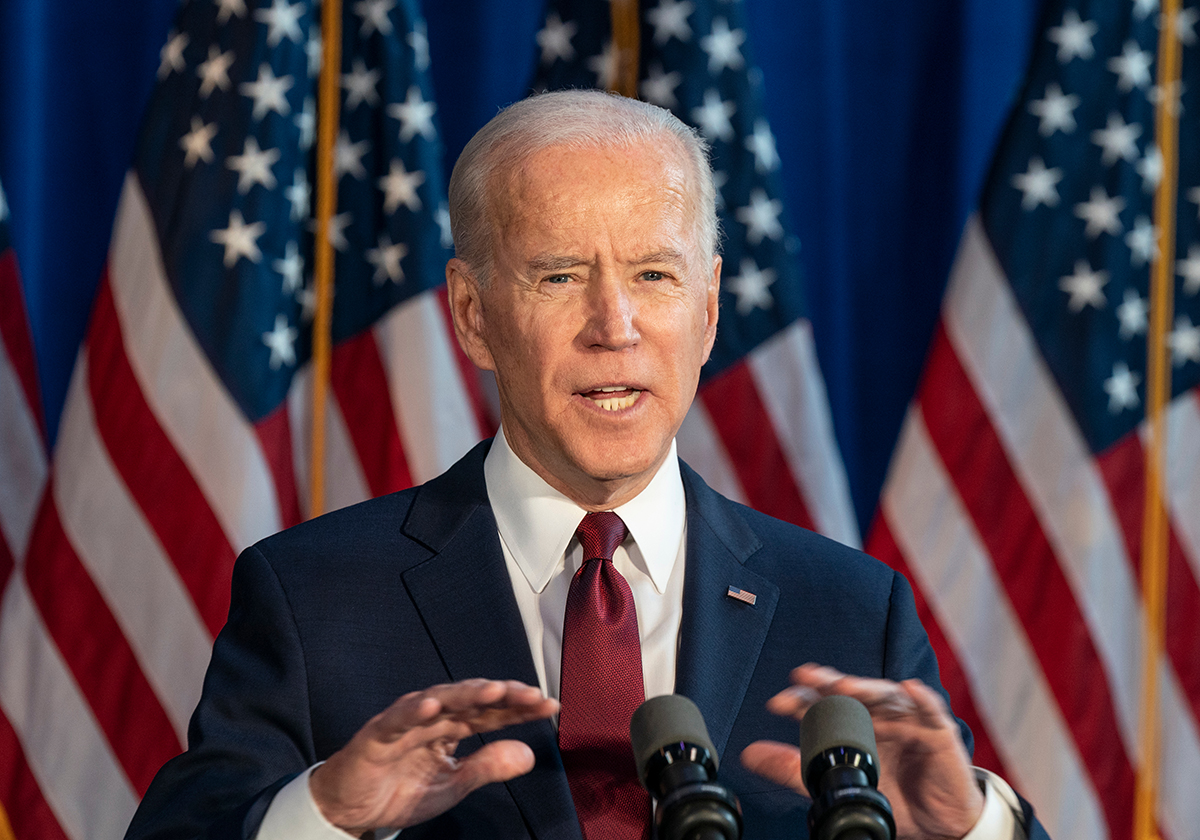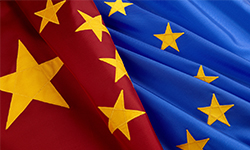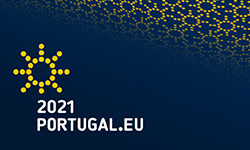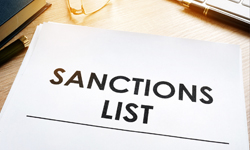BusinessEurope Headlines No. 2021-01
EU-US: business looks forward to a new era of partnership

Yesterday marked the inauguration of Joe Biden as the 46th president of the United States of America. It should also mark a new era for transatlantic relations that hopefully will be more cooperative and less conflictive.
An important signal, showing that a renewed dialogue has begun would be the elimination or at least suspension of tariffs while the two administrations negotiate a solution to the long-standing Airbus-Boeing disputes. In the medium term, the objective should be developing a common agenda, including but not limited to cooperation on China, WTO reform, climate and digital.
"We now have a chance to make a fresh start and enter a new era", BusinessEurope President Pierre Gattaz said. European business looks forward to a rekindled transatlantic partnership where the two sides jointly identify new opportunities for close cooperation in areas of common interest. "European citizens and business look forward to early signs that the United States again see the European Union as an ally and partner", he added. A negotiated solution to the Airbus and Boeing disputes would help turn the page and move on to other pressing issues like the much needed adoption of multilateral disciplines on subsidies and overall modernisation of the World Trade Organisation.
"While both our economies struggle with the dramatic economic and social impacts of Covid-19, the transatlantic economy can be a powerful engine to support a resilient recovery and bring back sustainable economic growth and new jobs. At the same time, our citizens both in the EU and in the USA would benefit from building a positive bilateral agenda that addresses pressing economic and societal challenges like climate change, digital transformation, healthcare or trade", Gattaz commented.
See our paper: ‘EU and USA- how to build a positive agenda'
![]() Contact: Luisa Santos
Contact: Luisa Santos
Photo credit: © lev radin | shutterstock
The post-COVID-19 implications for the EU's trade policy
 On 14 January, the D66 and the Renew Europe group in the European Parliament organised a webinar on "The post-COVID-19 implications for the EU’s trade policy", with the high-level participation of MEPs, academia and experts, including Luisa Santos, BusinessEurope Deputy Director General. "The COVID-19 pandemic has reinforced the digital space and the digital economy – how we work, how we interact – and it will take a very important role in the recovery. The same applies to the green transformation. However, business as usual cannot continue and we need to find ways to address the concerns and challenges that will be faced by companies", Santos stated. She also recognised that post-COVID-19, discussions on the role of the State in the economy are also important. For instance, the notion of national security is broadened and increasingly influences policy decisions, including in the area of trade. "These are considerations that are relevant not only at EU level, but also in the context of our relations with key trading partners, such as the U.S. and China, as they become more assertive in their approach to trade policy and adopt rules that are overarching and often conflicting", Santos concluded.
On 14 January, the D66 and the Renew Europe group in the European Parliament organised a webinar on "The post-COVID-19 implications for the EU’s trade policy", with the high-level participation of MEPs, academia and experts, including Luisa Santos, BusinessEurope Deputy Director General. "The COVID-19 pandemic has reinforced the digital space and the digital economy – how we work, how we interact – and it will take a very important role in the recovery. The same applies to the green transformation. However, business as usual cannot continue and we need to find ways to address the concerns and challenges that will be faced by companies", Santos stated. She also recognised that post-COVID-19, discussions on the role of the State in the economy are also important. For instance, the notion of national security is broadened and increasingly influences policy decisions, including in the area of trade. "These are considerations that are relevant not only at EU level, but also in the context of our relations with key trading partners, such as the U.S. and China, as they become more assertive in their approach to trade policy and adopt rules that are overarching and often conflicting", Santos concluded.
Contact: Sofia Bournou
Investment agreement is an important tool to rebalance relations with China
 "The Comprehensive Agreement on Investment (CAI) is the result of 7 years of negotiation and is an opportunity to rebalance the economic relationship with China. China is an important market for European businesses, and the CAI should increase market access for investors and create rules that will improve the level playing field for European companies in China", Luisa Santos, Deputy Director General at BusinessEurope said during a meeting with the European Commission on Tuesday 19 January. "China is already one of our key trading partners, and this agreement will create opportunities for European companies to compete on a more equal footing than they do today", Santos added. BusinessEurope met with the European Union’s chief negotiator for the agreement, Maria Martin-Pratt, to discuss the content of the agreement as well as next steps. The European Commission indicated that the full text of the agreement will be released this month. It will take some months, however, before the agreement will be fully ready for consideration by the European Council and European Parliament.
"The Comprehensive Agreement on Investment (CAI) is the result of 7 years of negotiation and is an opportunity to rebalance the economic relationship with China. China is an important market for European businesses, and the CAI should increase market access for investors and create rules that will improve the level playing field for European companies in China", Luisa Santos, Deputy Director General at BusinessEurope said during a meeting with the European Commission on Tuesday 19 January. "China is already one of our key trading partners, and this agreement will create opportunities for European companies to compete on a more equal footing than they do today", Santos added. BusinessEurope met with the European Union’s chief negotiator for the agreement, Maria Martin-Pratt, to discuss the content of the agreement as well as next steps. The European Commission indicated that the full text of the agreement will be released this month. It will take some months, however, before the agreement will be fully ready for consideration by the European Council and European Parliament.
Contact: Maurice Fermont
Business priorities for the Portuguese Presidency
 Portugal, which took over the rotating presidency of the Council of the EU on 1 January 2021, has a key role to play in putting the European Union on the right track to recover from the COVID-19 crisis and revitalise economic activity across the continent. In a letter to Prime Minister António Costa, the European business community expressed support for the 5 main priorities of the Portuguese Presidency to achieve a resilient, green, digital, social and global Europe. To allow business to fully play its role, we count on Portugal to focus on creating framework conditions that will enhance Europe’s long-term capacity to generate growth and employment and to encourage structural reforms. BusinessEurope is looking forward to working constructively with the Portuguese Presidency for the recovery in this enduring crisis, to bring long-term solutions to the economic and social challenges facing us.
Portugal, which took over the rotating presidency of the Council of the EU on 1 January 2021, has a key role to play in putting the European Union on the right track to recover from the COVID-19 crisis and revitalise economic activity across the continent. In a letter to Prime Minister António Costa, the European business community expressed support for the 5 main priorities of the Portuguese Presidency to achieve a resilient, green, digital, social and global Europe. To allow business to fully play its role, we count on Portugal to focus on creating framework conditions that will enhance Europe’s long-term capacity to generate growth and employment and to encourage structural reforms. BusinessEurope is looking forward to working constructively with the Portuguese Presidency for the recovery in this enduring crisis, to bring long-term solutions to the economic and social challenges facing us.
![]() Contact: Lisa Kastner
Contact: Lisa Kastner
Better protecting the EU's economic and financial interests
 The European Commission communication on "Strengthening the EU’s economic and financial sovereignty" is an important step to kick off a broader debate on making Europe’s economic and financial system more resilient to external actors and factors, particularly in the area of sanctions. BusinessEurope Director General Markus J. Beyrer commented: "A more assertive approach to economic and financial sovereignty can help to better protect European companies’ economic interests. Many of them have repeatedly been put between a rock and a hard place when it comes to extraterritorial effects of third-country sanctions. While multilateral coordination and dialogue with key partners like the USA remains the preferred path, we are looking forward to exploring options that can shield European economic operators from the negative impact of uncoordinated actions. In this highly sensitive policy area, close stakeholder involvement will be key in order to design effective solutions that do not lead to additional and unwanted barriers." BusinessEurope last year published recommendations in a dedicated paper, which discusses a series of targeted, workable measures to help EU companies impacted by foreign sanctions regimes.
The European Commission communication on "Strengthening the EU’s economic and financial sovereignty" is an important step to kick off a broader debate on making Europe’s economic and financial system more resilient to external actors and factors, particularly in the area of sanctions. BusinessEurope Director General Markus J. Beyrer commented: "A more assertive approach to economic and financial sovereignty can help to better protect European companies’ economic interests. Many of them have repeatedly been put between a rock and a hard place when it comes to extraterritorial effects of third-country sanctions. While multilateral coordination and dialogue with key partners like the USA remains the preferred path, we are looking forward to exploring options that can shield European economic operators from the negative impact of uncoordinated actions. In this highly sensitive policy area, close stakeholder involvement will be key in order to design effective solutions that do not lead to additional and unwanted barriers." BusinessEurope last year published recommendations in a dedicated paper, which discusses a series of targeted, workable measures to help EU companies impacted by foreign sanctions regimes.
![]() Contact: Jasmin Ploner or Sofia Bournou
Contact: Jasmin Ploner or Sofia Bournou
Calendar 
- 21 January: European Council video conference on vaccination strategies
- 28 January: The role of fiscal policy in mitigating the COVID-19 crisis - DG ECFIN workshop
- 22-25 February: EU Industry Week 2021
Not yet a subscriber? Register here.
Reminder: please have a look at our privacy policy